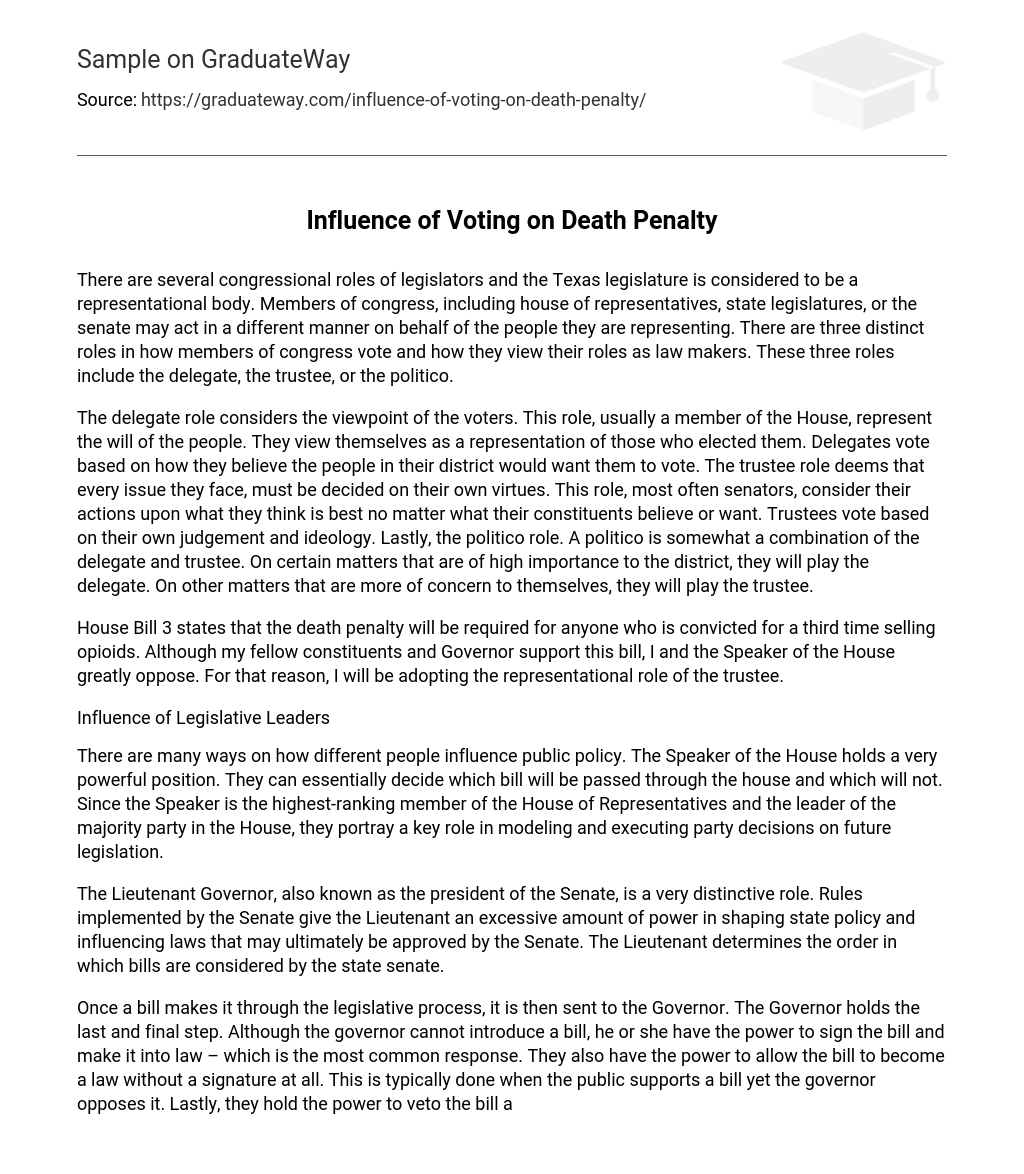There are several congressional roles of legislators and the Texas legislature is considered to be a representational body. Members of congress, including house of representatives, state legislatures, or the senate may act in a different manner on behalf of the people they are representing. There are three distinct roles in how members of congress vote and how they view their roles as law makers. These three roles include the delegate, the trustee, or the politico.
The delegate role considers the viewpoint of the voters. This role, usually a member of the House, represent the will of the people. They view themselves as a representation of those who elected them. Delegates vote based on how they believe the people in their district would want them to vote. The trustee role deems that every issue they face, must be decided on their own virtues. This role, most often senators, consider their actions upon what they think is best no matter what their constituents believe or want. Trustees vote based on their own judgement and ideology. Lastly, the politico role. A politico is somewhat a combination of the delegate and trustee. On certain matters that are of high importance to the district, they will play the delegate. On other matters that are more of concern to themselves, they will play the trustee.
House Bill 3 states that the death penalty will be required for anyone who is convicted for a third time selling opioids. Although my fellow constituents and Governor support this bill, I and the Speaker of the House greatly oppose. For that reason, I will be adopting the representational role of the trustee.
Influence of Legislative Leaders
There are many ways on how different people influence public policy. The Speaker of the House holds a very powerful position. They can essentially decide which bill will be passed through the house and which will not. Since the Speaker is the highest-ranking member of the House of Representatives and the leader of the majority party in the House, they portray a key role in modeling and executing party decisions on future legislation.
The Lieutenant Governor, also known as the president of the Senate, is a very distinctive role. Rules implemented by the Senate give the Lieutenant an excessive amount of power in shaping state policy and influencing laws that may ultimately be approved by the Senate. The Lieutenant determines the order in which bills are considered by the state senate.
Once a bill makes it through the legislative process, it is then sent to the Governor. The Governor holds the last and final step. Although the governor cannot introduce a bill, he or she have the power to sign the bill and make it into law – which is the most common response. They also have the power to allow the bill to become a law without a signature at all. This is typically done when the public supports a bill yet the governor opposes it. Lastly, they hold the power to veto the bill altogether. If the governor strongly disagrees with a bill, they are able to prevent it from becoming law.
Rank and Explain Influences of Institutional factors
Constituents may influence my vote by voting, petitioning, protesting, joining interest groups and political parties, and so on. They may even come to see me, call me, or go out into the district to contact me. Ranking in the highest of importance is my own ideology and views. I have very strong beliefs on something as sensitive and extreme as the death penalty. When it comes to crime laws, I believe that if one were convicted of selling opioids for a third time, then they should serve time in jail for their wrongdoings and not be held accountable for the death penalty. Serving time in prison will keep them off the streets and may even help them rethink their actions. Ranking second is the Speaker of the House. Since they are the majority of the party and have significant control over the chamber, they greatly influence my vote. And since the Speaker opposes the bill as well, it goes to show that their views align with mine.
Explain Your Vote
I will be voting against the bill. I understand your worries and concerns, however, there are many ways to handle situations like this when they arise. I believe that the death penalty should be reserved for crimes such as murder, homicide, or manslaughter. Proposing the death penalty upon drug dealers is not a solution to the already growing epidemic of drug trafficking. There is no evidence that supports this tactic will somehow reduce the opioid crisis. Although I know many of you agree with the death penalty for this crime, I believe it is not best for the people I am representing nor the country as a whole.





